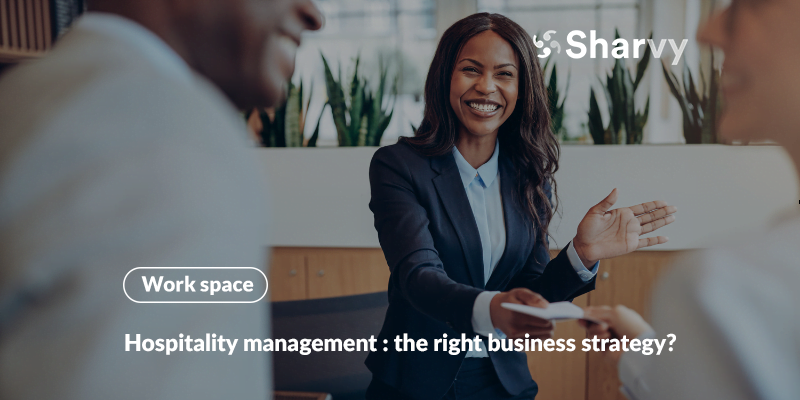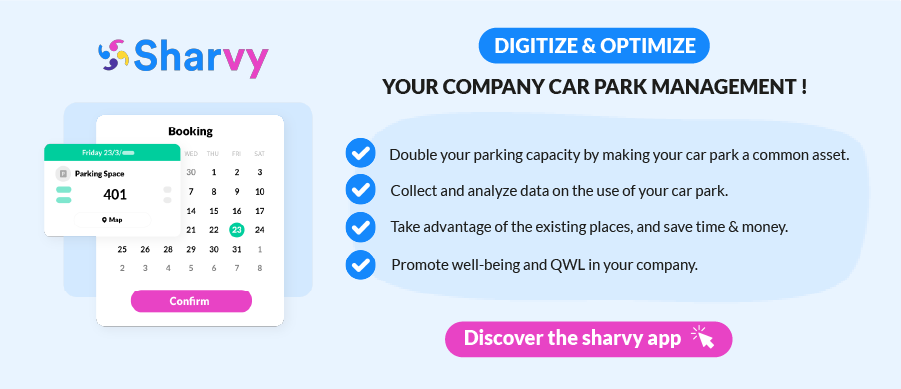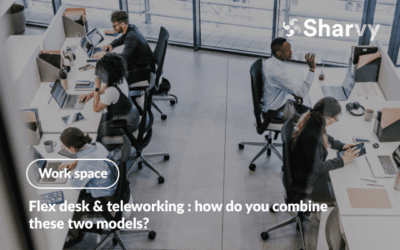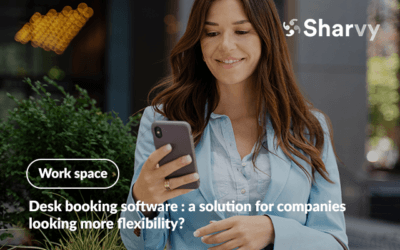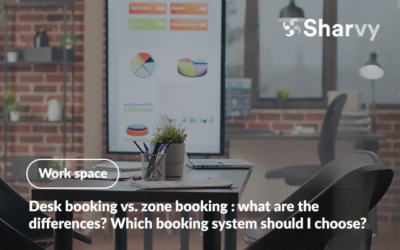The desire for convenience and efficiency is becoming increasingly pronounced in the hustle and bustle of our working lives. The seductive idea of a working environment where every need, from the most ordinary to the most specific, is met in the same place takes on a particular resonance.
This is where Hospitality Management comes in, offering an unprecedented perspective where the most common services, from mail management to resource reservation (parking spaces & workstations), converge harmoniously in a single location.
This bold vision, the precursor of a new paradigm within companies, is rooted in a trend that has already been perceptible for several years. But does it (really) respond to the growing need for a smooth, fluid work experience? And is it the right business strategy to adopt? Find the answers in this article.
What is Hospitality Management? An overview of the concept.
Hospitality Management is a concept initially used in the hotel & tourism sector to describe the experience that the host must offer to visitors. However, this concept is increasingly widespread and expanding in the professional world.
The idea is to reproduce hotel codes within companies. For example, a hotel has a reception, a restaurant, a customer experience & various services (access to the car park, concierge service, luggage storage, laundry, etc).
Therefore, Hospitality Management for companies consists of improving the reception and working environment with the concept of the “user path”. Like hotels, companies offer a range of services to help improve the day-to-day lives of their employees: reception, catering, access to the company car park, workstation reservations, entertainment, childcare, and so on.
So what used to be incidental is now real added value within companies.
Finally, Hospitality Management is an expression linked to “Care,” in other words, a caring work environment where the well-being of employees is a requirement. Consequently, the aim is to implement tools, practices, and policies to create a warm and welcoming working environment where a positive employee experience prevails.
Why should your company be interested in Hospitality Management?
In today’s post-COVID environment, where working patterns and career aspirations are changing, companies need to adapt by offering a welcoming, flexible, and stimulating working environment.
What’s more, the competition to attract & retain talent has become (even) more intense in a labor market facing a labor shortage. So if your company adopts the codes of the hotel industry by investing intelligently in Hospitality Management, it not only meets these changing expectations but also positions itself as an attractive employer, able to offer a rewarding & enriching working environment conducive to the professional & personal development of its employees.
There’s no doubt about it: today, just like salary, the working environment is a criterion of choice that illustrates a company’s culture. That’s why you need to rethink the employee experience within your company, considering this notion.
However, bear in mind that this is a never-ending journey, and you need to be nimble and one step ahead to take full advantage of all the benefits Hospitality Management has to offer.
How do you go about it? 5 ideas for integrating Hospitality Management into your business!
1. Modernize and make it easier for your staff to come to your site.
In today’s workplaces, the influence of Hospitality Management can be seen from when your employees arrive—that is, from when they enter the company car park. For many of your employees, this is the entry point to the working environment. Therefore, this reception must be a holistic experience characterized by friendliness, personalization, and efficiency.
But company car parks are (very often) a daily irritant. It rarely offers employees a positive experience. The reason for this? The number of users usually exceeds the number of parking spaces available, which inevitably leads to congestion, frustration, and (sometimes) non-compliance with car park rules. However, you can avoid many pitfalls by adopting the Hospitality Management codes. For example :
- As soon as an employee arrives at the car park, the experience can be digital : a camera reads the number plate of the vehicle arriving at the car park barrier. It authorizes access to the car park if a reservation has been made. A space is allocated dynamically, so there’s no need to turn around to look for one. As a result, employees no longer have to worry about finding a parking space in the morning, allowing them to start their working day more relaxed and focused.
- You no longer need the traditional badge that your employees can lose and swap between themselves to gain access to the building. A dematerialized version is much more reliable and allows you to manage access in fine detail – entry and exit – and to classify company areas to which outsiders do not have access rights. This type of access control can also be deactivated remotely once the employee’s work period is over, for example, for temporary and fixed-term contracts.
These services no longer need to be relegated to second place and add real value to your employees’ experience. Sharvy is one of the pioneers of this type of SaaS solution, which fits perfectly with a working environment where the notion of hospitality management is paramount.
2. Make it easy to reserve a workstation within your company.
In recent years, hybrid working has become the norm, and we are seeing a massive and uninhibited adoption of teleworking. This context is bringing companies face to face with a new reality: the more ambitious the number of teleworking days, the less sense there is in maintaining one workstation per employee. Not least because employers are bitterly observing many vacant spaces, for which they are paying a high price.
Faced with this phenomenon, companies must reinvest more strategically. That’s why the flex office is becoming increasingly popular.
Under this new work organization, employees can choose where they work according to their needs, missions, and objectives for the day without any hierarchical or corporatist concerns. In this way, employees regain control over their working environment. Each day has its desires, objectives, and affinities.
However, the fear of not having a seat if you don’t arrive early in the morning is omnipresent in the flex office. So, to ensure that early risers are not spoilt for choice and that places become scarce after 9 am, I suggest introducing a desk booking tool, such as Sharvy.
It’s an innovative solution that allows your staff to anticipate their needs & reserve a workstation in advance. They can do this remotely and at any time of day. They also have an overview of the workspaces available when they want to be in the office. In this way, scheduling conflicts disappear, enhancing employee experience.
Consequently, integrating a desk booking tool is a form of Hospitality Management that now meets your employees’ (new) everyday needs and makes their day-to-day lives easier.
Just like arriving at a hotel (where only some come with clean sheets), arriving at your company’s premises presents similar challenges: once you’ve booked a workspace, all your staff must settle in and get to work.
3. Offer a collective catering service within your company.
Who has yet to experience that moment in business when time is running out, but a meal is necessary to ensure the day runs smoothly? Going to meetings on an empty stomach is not the solution. But neither is swallowing a sandwich in fourth gear that tastes dubious.
That’s why offering your employees a cafeteria directly on your premises is a valuable advantage. You offer a wide choice of menus that change daily, and you also provide a meeting point where your employees can share a convivial moment over a meal, encouraging exchanges between colleagues and strengthening team cohesion.
Moreover, your employees benefit from high-quality meals at beautiful prices. The meal cost for an employee is around €3.80 (all solutions combined), as the company covers up to 50% (on average) of the cost. So, it’s much cheaper than a meal outside your company. So, by offering this service, you are (indirectly) offering your employees purchasing power and balanced meals with quality products, some of them local, to improve their health.
Hospitality Management is about imagining and creating places of exchange where the corporate culture is revealed, and the company supports employees throughout their working day, even during their lunch break.
4. Offer a unique range of services with a corporate concierge service.
Although corporate concierge services have been gaining ground in recent years, they still need to be widely used in French companies. Sometimes seen as an accessory or even a gadget, concierge services are (still today) relegated to the background, even though they are one of the pillars of a well-thought-out Hospitality Management strategy.
Like its prestigious counterpart in the hotel industry, the corporate concierge service aims to offer your employees access to a range of services and products directly in the workplace. Depending on the national, regional, and local partnerships established, these concierge services can offer :
- Dry cleaning, alterations, reception, and various delivery services.
- Assistance with unpleasant administrative procedures.
- Access to childcare, cleaning, and car maintenance services.
- Reservation services & wellness areas (spa, yoga, gym, etc).
So, while a company concierge service has a non-negligible financial cost, its benefits mean a real return on investment, both internally (with your employees) and externally (with your future talent).
What’s more, you’ll significantly improve the employee experience. That’s right because by setting up a corporate concierge service, you’re incorporating the symmetry principle of attention, i.e. giving as much attention to your customers as you do to your employees.
It seems obvious, but an employee cannot reproduce the experience promised to the customer if they have never been exposed to it or lived through its execution. It’s a question of common sense. Putting something into practice is impossible if it’s just a concept to them.
However, it is also a question of employee commitment. If all the energy, attention, and resources are focused on the customer, and only the bare minimum is provided, a gap will open up that can only lead to disengagement. Employees can no longer bear to be in poor relations regarding the company’s attention and care.
Integrating hospitality Management strategies into your business is the whole point, and it can start with creating a concierge service.
5. Recruit a person dedicated to these challenges: the Hospitality Manager.
As a pivotal figure, the Hospitality Manager orchestrates a working environment that nurtures both the personal and professional growth of your staff. To this end, here is a (non-exhaustive) list of its missions :
- Welcoming new arrivals and ensuring their comfort by offering them something to drink.
- Guide them around the premises and put them in touch with their contacts.
- Secure the reception area & be able to alert security staff if necessary.
- Handling mail and parcels, providing telephone and secretarial assistance.
- Facilitate the car park management and workstation reservations.
- Fostering team spirit and social cohesion.
- Encourage exchanges and communication between all levels of the hierarchy.
- Creating and leading communities.
- Carry out observation rounds to check equipment (printer loaded with paper, window properly closed, etc).
It’s important to note that the Hospitality Manager ensures equal treatment for everyone on the site. Both visitors and in-house staff are provided with the same level of service and benefits. Furthermore, it uses a range of indicators, such as staff turnover, office occupancy rates, satisfaction rates, etc., to help it identify the right areas for improvement.
In conclusion : what trends will Hospitality Management follow in the future?
Observations of trends in hotel hospitality allow us to predict those that will emerge within companies. For example, the further we go down the road, the more digitalized the hospitality experience will become (parking and access to the building, for example), thanks to the increased use of technology.
At the same time, the hyper-personalization of interactions made possible by CRM data will (further) facilitate & enhance the hospitality experience. Finally, Hospitality Management strategies will favor renewable energies & adopt more environmentally friendly practices within buildings, undoubtedly enhancing the employee experience.
As a result, the future looks bright for Hospitality Management within companies.
A question? Check the following FAQ!
What impact does Hospitality Management have on the employer brand?
By implementing Hospitality Management strategies, companies improve their working environment and strengthen their position as employers of choice in a competitive market.
On the one hand, they contribute to employee satisfaction and commitment by offering a pleasant, caring, and welcoming working environment. At the same time, they help attract new talent because more and more candidates are looking for companies that value their well-being and make their day-to-day lives more manageable.
On the other hand, investing in the well-being of employees & offering high-quality reception services enables a company to enhance its brand image. This is reflected among employees, candidates, customers, and business partners.
What are the benefits of a Hospitality Management strategy for companies ?
There are many benefits, both for the company and its employees. These include :
- Improved retention and attraction of new talent.
- Improved corporate image.
- A working environment that promotes well-being and QWL.
- An improved employee experience.
- An optimized real estate footprint.
- Increasingly, digital reception experiences boost productivity.
Want to learn more? Check out our latest articles!
Flex desk & teleworking : how do you combine these two models?
What is the flex desk in the workplace? Why combine it with a teleworking policy? How do you go about it? What advice do you have?
Desk booking software : a solution for companies looking for flexibility?
What are the advantages of desk booking software? How do you make your choice? What questions should you ask? Our expert advice!
Desk booking vs. zone booking : what are the differences?
What are the main differences between desk booking and zone booking? Which booking system should I choose? Focus.
Subscribe to our newsletter!
Resources
Contact us
+44 117 463 6990

